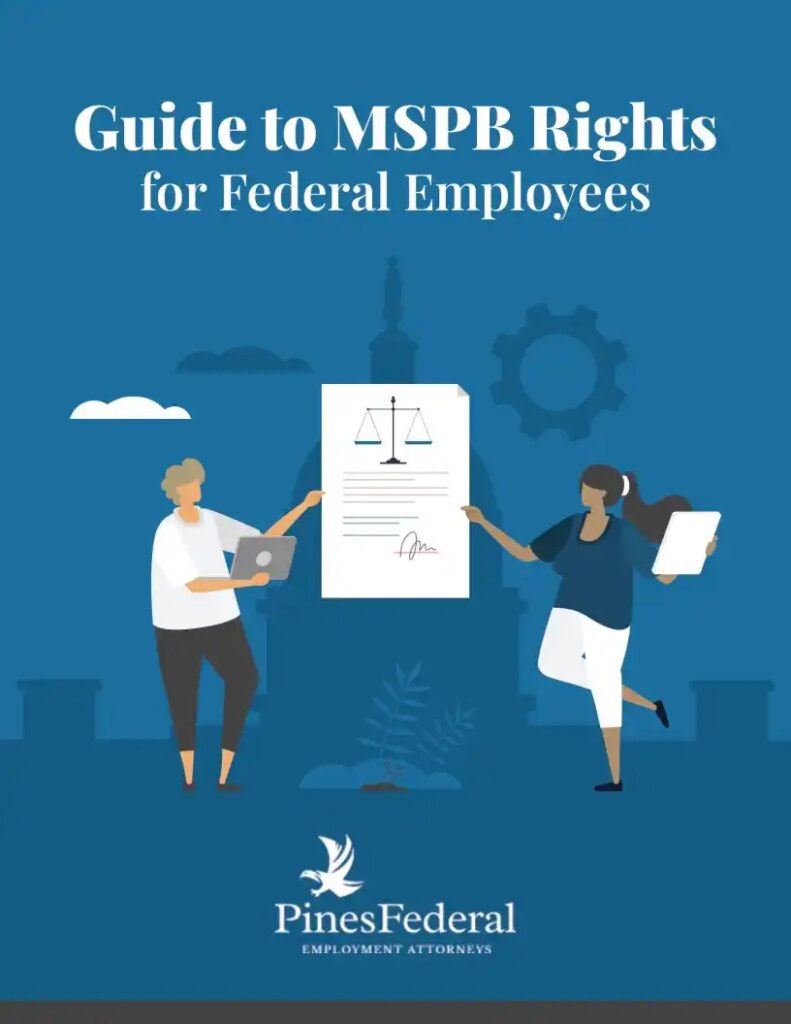MSPB Services for Suspension, Demotion, or Termination Complaints

Unlike their private-sector counterparts, employees of the federal government have unique rights under the constitution. To protect these rights, Congress created the Merit Systems Protection Board (MSPB) in 1979 under the Civil Reform Service Act of 1978.
Under this same act, Congress defined certain practices as “Prohibited Personnel Practices.” Prohibited Personnel Practices (PPP) include prohibited actions like suspensions, demotions, terminations, retaliatory acts, and other matters.
Therefore, if you are facing potential disciplinary action or retaliation, you may need to file an appeal with the MSPB to protect your career and your future. If that happens, it is in your best interests to be represented by a law firm that you can trust to protect your rights in MSPB cases. Our federal employment lawyers have served employees with premier, intelligent legal representation for all employment cases.
Particularly when filing an MSPB complaint, you can depend on the experience of our seasoned MSPB attorney to guide you through the steps necessary to protect your rights as a federal employee. We pride ourselves in being experienced and accessible for our nationwide clients.
Learn how we can assist you by calling (800) 801-0598 or sending us an online message today.
Know Your Rights with Our Team on Your Side
As a federal employee, you have certain rights regarding adverse or other prohibited personnel practices in federal employment law.
If you believe you have been subjected to a suspension, demotion, or termination that that is unwarranted, unfair, arbitrary, and/or discriminatory or if you have been subjected to a personnel action in retaliation for whistleblowing, you may be able to take your complaint to the Merit System Protection Board (MSPB) pursuant to the Civil Service Reform Act of 1978.
At Pines Federal, our MSPB attorneys provide government employees with representation in most MSPB employment cases. So, whether your employment dispute is unwarranted, unjust, arbitrary, or discriminatory in nature, our MSPB lawyers can help. How we begin will depend on the nature of your case and your employment status.
If you’re a part of a bargaining unit, in probationary status, or hold a supervisory position, our MSPB complaint attorneys can litigate your case.
Call us at (800) 801-0598 to schedule a consultation. We can review the details of your case and begin planning right away.
Proven Track Record of Success
YOU CAN COUNT ON US: We’ve achieved nearly a dozen victories at MSPB in OPM FERS Disability cases in the past year.
What Are My Rights as a Federal Employee?
Under federal law, federal agencies can take two kinds of action against their employees for poor performance or misconduct. The first kind is called a disciplinary action. Disciplinary actions include less serious punishments. Examples include oral or written counselings, letters of warning, letters of reprimand, and short suspensions (14 days or fewer). The second kind is referred to as an adverse action.
Adverse actions include suspensions that last for longer than 15 days, demotions, and removals. Depending on which of these two actions you are facing, you will receive different levels of due process rights.
If you are facing a disciplinary action, the law guarantees you the following rights:
- The right to know why the agency is taking action against you. The agency needs to tell you what you allegedly did wrong and provide a brief description of the circumstances of your misconduct.
- The right to review the evidence supporting the agency’s action. The federal employer must provide you with a copy of all evidence supporting the allegations against you.
- The right to respond. Once the agency has issued you the notice of disciplinary action, they must give you a sufficient window of time to respond and present your side of the story.
- The right to have legal counsel represent you. Anyone can serve as your representative, including your friend, family member, and a licensed MSPB attorney.
If you are facing an adverse action, you also receive all of the above rights. In addition, your agency must also provide you with advance notice of the adverse action. This means they give you a proposal letter notifying you of the upcoming adverse action at least 30 days before they actually impose the discipline.
Finally, you have appeal rights to the MSPB. In other words, even if the agency implements the adverse action, you can still have it overturned by appealing to the MSPB. In any case, you should immediately contact an MSPB lawyer to represent you after you receive a proposal letter.
[DOWNLOAD] MSPB Rights for Federal Employees

What Is the MSPB?
The MSPB is an independent entity of the executive branch of the federal government with quasi-judicial powers to hear complaints or appeals from federal workers about certain personnel actions taken against them.
The MSPB hears a variety of appeals from adverse employer actions, including:
- Terminations/Removal Actions.
- Demotions.
- Suspensions of more than 14 days.
- Grade or pay reductions.
- Denials of within-grade salary increases.
- Performance-based reductions in grade or pay.
- OPM suitability determinations.
- OPM employment practices.
- USERRA.
- Whistleblower reprisal/retaliation.
Should your appeal be one that is not heard by the board, it may be considered instead before the Office of Personnel Management (OPM), or by the Office of Special Counsel in matters where a personnel action may have been taken or is about to be taken. Contact one of our federal employee attorneys at Pines Federal if you have filed or are considering an appeal regarding any of these issues.
Who Can File an MSPB Appeal?
The MSPB has jurisdiction over most employees in the competitive service and in the excepted service. However, employees who have not finished their probationary period in the competitive service generally do not have MSPB appeal rights. Similarly, excepted service employees do not receive MSPB appeal rights until they have at least two years of continuous service.
That said, probationary employees can still file an MSPB appeal under special circumstances. If you want to learn more about whether you have MSPB appeal rights, contact one of our qualified MSPB attorneys right away.
Featured Case Result
Client received notice of misuse of government devices and inappropriate conduct. We mitigated the proposed removal to a last chance agreement. – Read more client success stories…
Whistleblower Reprisal Complaints
It is the policy of the federal government to encourage employees to notify federal representatives or certain designated persons regarding unlawful conduct or practices by the employer.
If an agency takes certain employment actions against you for making such a complaint, you may be entitled to relief. You are protected if disclosures are made to the Office of Special Counsel, the agency’s Inspector General or a designated person, or if such disclosures are not prohibited by law.
Examples of typical whistleblower disclosures include:
- Rules or regulations violations.
- Gross mismanagement.
- Abuse of authority.
- Substantial and specific danger to the public health or safety.
- WPA or WPEA
- Fraud, waste, abuse, or mismanagement.
Please note that these cases can go to the MSPB if the OSC does not find a violation. In this case, the matter would be called an Individual Right of Action (IRA).
Whistleblower Appeals
There are two types of whistleblower appeal cases. In the first type, the appellant is subjected to a personnel action, such as a removal, that is directly appealable to the Merit Systems Protection Board.
The appellant can claim the removal was in retaliation for whistleblowing, and therefore serves as an affirmative defense against the removal. Both the appealable personnel action (the removal) and the whistleblower reprisal claim are reviewed by the MSPB.
The other type of appeal is the “individual right of action,” (IRA) which was created by the Whistleblower Protection Act.
In an IRA appeal, the appellant was subjected to a personnel action that is not directly appealable to the MSPB (for example, a poor performance evaluation). The appellant claims that the poor evaluation was issued because of his whistleblowing. The appellant must first file a complaint with the Office of Special Counsel. If the OSC does not seek corrective action on his or her behalf, they can file an IRA appeal with the MSPB.
If in his or her IRA appeal, the appellant alleges they were subject to a personnel action that is directly appealable to the MSPB, the case still will be adjudicated as an IRA appeal. This means that the MSPB will not review the merits of the action. The board will resolve only the whistleblower reprisal claim.
If certain personnel actions were taken against the whistleblower, a complaint is filed with the Office of Special Counsel, which can thereafter be appealed to the MSPB. If it does not, then you may file the appeal with the MSPB.
Our legal team has significant experience with whistleblower reprisal complaints and can advise you on how to proceed in such matters.
Contact Our Experienced MSPB Attorneys
At Pines Federal, our MSPB lawyers have decades of combined experience serving federal employees nationwide. Reach out to us today if you feel an employment decision that levied against you was unfair, discriminatory, and/or arbitrarily rendered.
Contact Pines Federal online or call (800) 801-0598 today to request a consultation.





